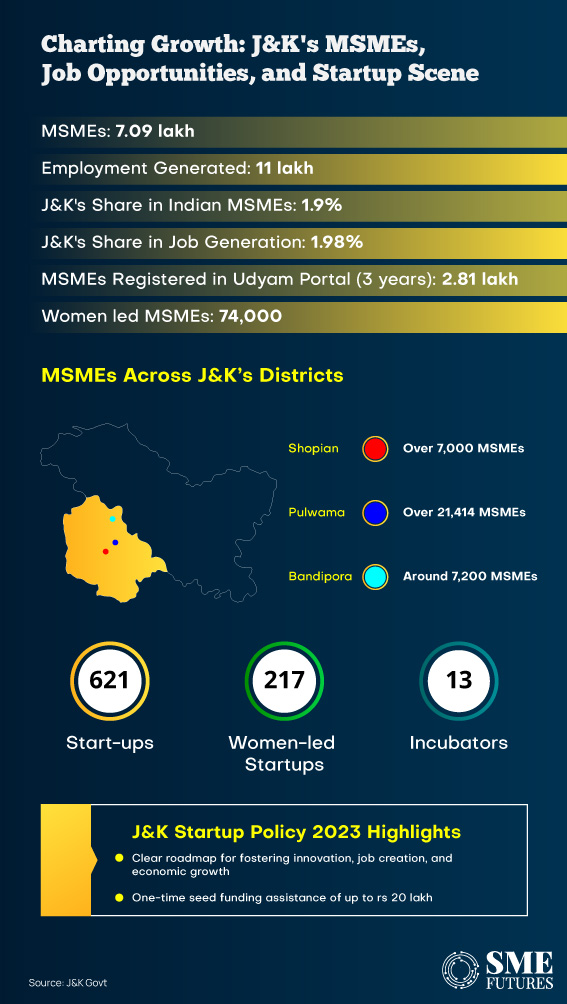August 2023 witnessed a remarkable milestone in Jammu & Kashmir (J&K) when over 10 of its products earned GI tags. Excitingly, five others of its craft treasures- Kashmiri Namda, Wagguv, Shikara, Gabba, and Kashmiri Willow Bat, are currently in the process of securing this label.
According to Mahmood Ahmad Shah, Director of Handicrafts and Handlooms, Kashmir, the introduction of GI Tags has ignited a revolution in the Kashmiri handicraft industry. These tags serve as formidable guardians, shielding cherished traditions from counterfeit threats while highlighting the abundant cultural heritage of this picturesque region.
The GI tagging of its products is just the tip of the iceberg. What’s truly exciting is the recent buzz in the state’s economic arena.
The G20 tourism summit has already made a remarkable impact by injecting fresh life into the state’s economy through a substantial boost in its tourism sector. Even New Delhi grabbed this opportunity to show the world that life is normal in the region, especially after the abrogation of Article 370.
J&K is changing
Jammu & Kashmir was once a place where violence, curfews, and uncertainty prevailed. However, there has been a sea-change in the state in the past five years.
After the abrogation of Article 370, Jammu & Kashmir underwent a transformation, aligning with 890 central laws while scrapping 250 outdated state laws. Furthermore, 130 state legislations have been revamped to create a more conducive environment for businesses. These sweeping reforms have paved the way for an investor-friendly ecosystem there.
Local businesses claim that they are experiencing an economic revival, especially due to the G20 tourism summit. As per media reports, along with domestic tourism skyrocketing in this region, in the first six months of this year, over 15,000 foreign tourists also arrived there.
This has resulted in a boom for J&K based MSMEs and start-ups.
43-year-old Jawed Bakher, a pashmina shawl seller told media that tourists flocked to his souvenir shop during the G20 event.
Dr Touseef Ahmed, Chairman, IT, Start-ups & Networking, The Kashmir Chamber of Commerce & Industry, agrees, saying, “Over the past 4-5 years, we’ve witnessed a significant transformation in the MSME sector. They’ve played a vital role in uplifting the region, despite the earlier slowdown due to the pandemic. Both the government and the MSMEs are working together to provide support.”
MSMEs are flourishing
According to the Udyam Portal, in the last three years, the state witnessed an impressive 2.81 lakh MSMEs registrations. Also, over 74,000 small businesses are helmed by women there.
In a bid to support small businesses, earlier this year, the state government raised the annual procurement limit for all J&K departments and Public Sector Undertakings (PSUs) from Micro and Small Enterprises (MSEs) from 20 per cent to 25 per cent. Out of this 25 per cent, 3 per cent of the total annual procurement is reserved for women-owned enterprises.
“Lately, we have been getting a lot of business enquiries for Kashmir’s saffron,” says Sachin Mahajan, exporter of GI tagged Kashmiri saffron.
“The government has taken steps to grow our economy. To begin with, Kashmir’s saffron is GI tagged to protect its uniqueness and prevent its unauthorised use. Due to this, customers have faith in our products and our market is developing in India as well as abroad,” he adds.
Businessman Zubair Drabu from Banihal contends, “I am a trader of all sorts of dry fruits, saffron and spices. This is an opportune time, and I am seeing a good demand for my products. The government is also giving us various opportunities to showcase our products in various shows like this one.” He was showcasing his products at the 9th MSME Expo in Delhi.

Start-ups are booming
In the first half of this year, Jibran Gulzar, a 24-year-old entrepreneur from J&K made news when he was nominated for the Forbes 30 under 30 list for Asia. He is the founder of a hyperlocal start-up, Gatoes.
Similarly, woman entrepreneur Tabish Habib from Samba founded an organic and natural food products company in 2022 and is now giving employment to the local youth.
While showcasing her organic products at the MSME Expo, she talks about the various entrepreneurs coming out of the region.
“There has been a surge in food products from Kashmir, so more companies are coming up. I started this company to let the world know about the organic and natural food from our region. The idea is to revive our forgotten natural products. So far, our online business is performing well. We also sell our product in Khan Market, Delhi,” she says.
Due to the ease of doing business there, start-up culture is steadily gaining ground in J&K. There are 621 start-ups there, 217 of which are women led, reflecting the growing trend of female entrepreneurship in the region. Also, 13 incubators are aiding the emerging start-ups from this region.
To further bolster J&K’s start-up ecosystem, the government will implement its new start-up policy 2023 in October.
Lt. Governor Manoj Sinha revealed that the Union Territory (UT) administration has drafted this policy. Apart from offering a clear roadmap for fostering innovation, job creation and economic growth, the policy will provide one-time seed funding assistance of up to Rs 20 lakhs for incubator and accelerator infrastructure and mentorship for aspiring entrepreneurs.
“Jammu & Kashmir is offering high-impact entrepreneurship, resources, and abundant opportunities to serve the global market. It is the perfect place for any entrepreneur who is looking for the next big thing with the goal of becoming the first mover,” the Lt Governor said at a media forum.
But there are challenges as well
While it’s undeniable that businesses in Jammu and Kashmir have demonstrated commendable growth in the face of significant challenges, there are persistent obstacles impeding their overall development.
These hindrances include inadequate infrastructure, electricity shortages, political instability, and financial constraints, which can be attributed largely to the geopolitical concerns affecting stability and scalability in this region.
Dr. Ahmed highlights the overwhelming flow of information as a primary challenge, as it can be particularly confusing for students and entrepreneurs.
“We need to streamline this information, ensuring that it reaches the right people and avoids creating confusion. Also, the pandemic has had a significant impact on the small enterprises here,” he asserts.
M. Imran Khan, PhD, Assistant Professor, School of Economics, NMIMS, Mumbai, points out in his commentary for Greater Kashmir that J&K’s 2023 Economic Survey omits two major aspects in the overall assessment.
“Firstly, it is essential to acknowledge that the J&K economy had to endure a double lockdown. The abrogation of Article 370 and 35A in 2019, followed by the nationwide lockdowns imposed significant challenges on the state’s economy. However, the survey fails to provide estimates of the magnitude of the loss of jobs or work. Secondly, the survey claims post-COVID recovery based on the increase in worker and labour force participation rates but fails to report the qualitative assessment of recovery in terms of the nature of the employment generated in the economy,” writes Khan.
This suggests that the region has been grappling with unemployment.
Are there enough jobs?
According to Nisar Ahmad Wani, Director of Employment in J&K, the actual unemployment rate in the state is 5 per cent, as reported by the Ministry of Statistics and Programme Implementation (MoSPI). The department aims to reduce this rate to zero in the next three years. However, despite hosting numerous job fairs, young people in J&K struggle to secure employment due to a substantial skill gap that doesn’t align with market demand.
Shivangi Sharma, who works for an FMCG start-up as production incharge in Jammu says, “It’s a big challenge for us to convince the youth to come and get trained and work with us. It’s difficult to retain them. Even though the authorities are providing us with opportunities, the youth is migrating for well-paying jobs to other regions.”
Agriculture is suffering too
Also, traditional saffron making businesses have their own set of challenges. One of them is saffron trafficking. “Nowadays fake saffron is very rampant,” says Mahajan.
“The saffron being sold in the name of Kashmiri saffron is either fake or of low quality. It spoils our name. It’s a major challenge that we are yet to overcome,” he adds.
Dr Ahmed asserts that the government’s GI tagging initiative is going to counter this problem and further promote indigenous products.
Overall, J&K’s economic resurgence stands as a testament to its unwavering resilience and adaptability. Despite the formidable challenges it faces, the region is making remarkable progress, encompassing both time-honoured craftsmanship and modern start-ups.
While its trajectory towards sustained growth and prosperity is promising, it’s crucial to emphasise the need for increased awareness and the promotion of various initiatives. This isn’t about fostering competition but rather about ensuring that businesspeople remain well-informed during their entrepreneurial journeys.











